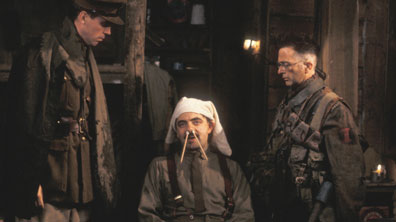
One of the great fortunes of studying the First World War at A-level right now is the wealth of interesting resources available for you to access. It wasn’t always this way, of course; in the dark days when I first began writing this blog you could barely get an amusing gif of Fieldmarshal Haig tripping on a duckboard.
Not exactly true, but you get my gist. The centenary has been a good time for students of First World War history and literature to learn about life from 1914 to 1918.
On Monday I was lucky enough to catch an episode of Dan Snow’s ongoing Radio 4 series about the conflict, ‘Voices of The First World War’. This series is a goldmine for those of you fretting about your lack of historical knowledge about the war. In the UK you can listen online or download the series as MP3 files (outside the UK, I’m not so sure).
Each episode in the series is under fifteen minutes long, and focuses on a single aspect of the war, from First Impressions on the outbreak of the war to most recently (and fortuitously given my last post!) the emergence of new technologies like Tanks.
The episode that caught my attention was entitled ‘Sheffield and the Somme’. It is, admittedly, an upsetting program. In it, Sheffield locals give their own firsthand accounts of the effect upon the community of the massacre of the Sheffield City Battalion, or as they were then known, the ‘Sheffield Pals’.
The Pals Brigades are one of the more sobering facts of the First World War. They were a successful recruiting method whose formation had unseen and tragic consequences in battle. Men from a particular locale or men who found themselves in a particular type of employment could enlist with friends and colleagues with the prospect of staying with them for the rest of the war. In 1914-15, this break with army tradition was felt necessary to encourage mass conscription. The New Army formed- also known as Kitchener’s Army, named after the Secretary of State for War- was an army of millions, ready for active duty by the end of 1915. In fact, many of the Pals brigades first saw action in the battle of the Somme in July 1916.
The unforeseen consequence of this method of recruiting was that when a battalion faced a massacre, as the Sheffield Pals did on the first day of the Somme, the area from which the Pals brigade was taken took disproportionate and catastrophic numbers of casualties. Between July 1st and July 3rd, 1916, the Sheffield Pals- which had recruited somewhere between 900 to a thousand men in two days in August 1914- sustained 495 men dead, injured or missing. The terrible consequences of such massed death was keenly felt in the districts from which the men came. Whole cities felt the devastation of loss.
Hindsight is a wonderful thing, of course, when we judge the formation of such brigades, and certainly they played their part in the creation of a large and well-trained conscript army. Yet it is too little noted that foresight is a wonderful thing too; would that it had been more in evidence in British plans for the conflict. Sheffield writer John Harris notes of the Sheffield Pals, they were “Two years in the making; ten minutes in the destroying. That was our history”.
‘Sheffield and the Somme’ captures this shocking moment in British history through the dignified testimony of those who suffered. It is well worth your attention, as is the rest of the series. Should you wish to read on- particularly, perhaps, if you are reading Whelan’s ‘The Accrington Pals’- there is also an excellent website, Pals.org.uk, which details the formation of several of these brigades.



